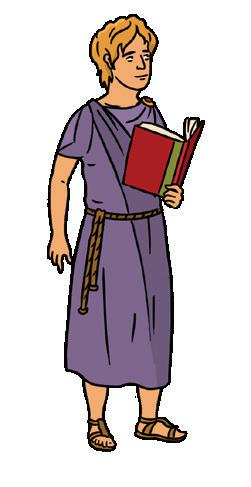
1 minute read
Absolutely Everything!
Each month we feature an amazing story from world history taken from the bestselling book by Christopher Lloyd, with illustrations by Andy Forshaw. This month: Alexander the Great and the Romans!
As a young man, Prince Alexander was a good student and great with horses. At least he was great with his own horse, Bucephalus. His father, Phillip II, was king of the northern Greek city-state of Macedon and was busily creating an empire by defeating other states. So of course he could afford the best education for his son. When Alexander was 13, his dad hired a great philosopher to run a small school for Alexander and his friends.
Below: a scene showing the Battle of Issus, at which Alexander defeated Darius III of Persia.
That teacher was named Aristotle, and he ended up as probably the most famous Greek philosopher of all time. He thought and wrote about everything from nature to space and from city politics and public speaking to poetry, music, memory and logic. Aristotle’s thinking led him to a very important idea. He wrote that a basic set of natural laws could explain everything to do with everything. Understanding these rules was the key to unlocking the meaning of life. The best way to achieve this was using your senses to carefully observe the world around you. He probably taught some of these ideas to Alexander and his classmates.


Alexander’s father was just getting ready to invade the Persian Empire to expand Macedon even further when he was assassinated, or killed. It was 336 BCE, and Alexander was 20 years old. Suddenly he was King Alexander. As king, his number one goal was to finish conquering the world.
Incredibly, he turned out to be really, really good at it. For the next 12 years or so, he led an army of around 40,000 Greek soldiers. They crossed Persia,
Aristotle (right) taught Alexander the Great (left) when he was a boy at Mieza in Macedonia. Maybe it was Aristotle’s teachings that inspired Alexander to extend his empire across parts of Europe and the Middle East and into Asia.










